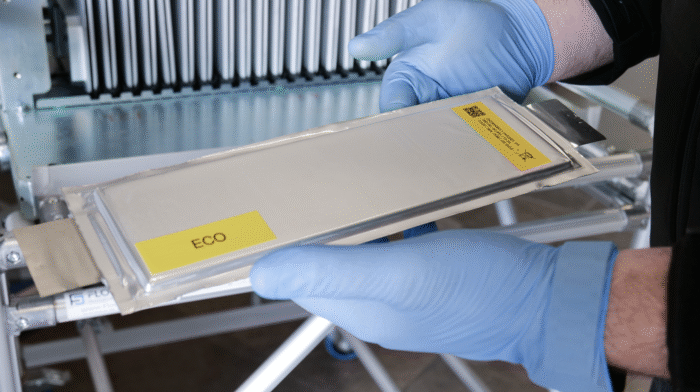Altilium has demonstrated the UK’s first EV battery cells produced using recycled cathode active materials, in partnership with car manufacturer JLR.
The collaborative project, supported by the Advanced Propulsion Centre UK (APC) as part of its Advanced Route to Market Demonstrator (ARMD 3) initiative, aids the development of a circular economy and highlights the potential of recycled materials for high-performance EV applications.
By demonstrating that battery cells can be manufactured at scale using recycled materials, the project aims to deliver a carbon reduction technology in battery electric vehicles (BEVs), helping original equipment manufacturers (OEMs) meet their sustainability targets and building the foundations for a resilient battery supply chain for the UK.
Altilium and JLR’s automotive-grade NMC 811 multilayer pouch cells were manufactured using cathode active material (CAM) recovered from end-of-life EV batteries using Altilium’s EcoCathode process. The concentration of recovered CAM meets the 2036 target for minimum recycled content levels as set out in the EU’s new battery regulations (26% cobalt, 12% lithium, 15% nickel).
Following initial electrochemical testing – which demonstrated comparable performance with conventional primary materials – the cells are now undergoing comprehensive validation studies at JLR’s battery testing facilities.
An independent lifecycle assessment (LCA) carried out by UK sustainability consulting and advisory group Minviro confirms significant reductions in climate change impact compared with primary mined materials. For NMC 811 pouch cells produced in the UK, the use of 100% recycled CAM could reduce greenhouse gas emissions by 32% compared with cells using virgin materials mined and refined in Asia.
Significant reductions were also observed for the other three impact categories identified within the Product Environmental Footprint Category Rules (PEFCR) for high specific energy rechargeable batteries for mobile applications: 30% reduction in particulate matter formation, 58% reduction in freshwater ecotoxicity and a 38% reduction in metal/mineral resources.
In addition to the multilayer pouch cells produced with recycled CAM, the collaboration produced single-layer pouch cells containing 100% recycled cathode and graphite anode materials.
Dr Christian Marston, COO and co-founder of Altilium, commented, “This is a major technical breakthrough and a vote of confidence in the UK’s ability to lead in battery recycling. We’re taking the first steps to prove that recycled materials can meet performance standards required by the automotive sector, while dramatically reducing emissions and reliance on imported raw materials.”
Altilium’s EcoCathode process recovers 95% of the cathode metals from battery waste and 99% of the graphite. The cathode metals are then upcycled to produce high-nickel CAM, ready for direct reuse in new batteries, while the graphite undergoes further purification for use in anode production.
Dr David Sellick, product sustainability propulsion SME and JLR project lead, said, “This project reinforces JLR’s leadership in sustainable innovation, marking a significant step forward in reducing the environmental impact of the largest contributor to an EV’s carbon footprint – the battery cell. Our clients expect uncompromising performance, and this collaborative initiative demonstrates that sustainable practices and innovation can go hand in hand.”
In related news, BlueOval SK has announced that its commercial battery production is officially underway at its Kentucky plant in Glendale


